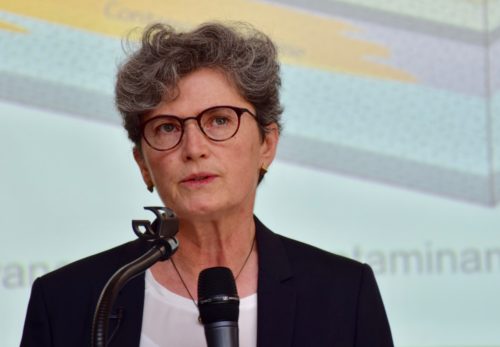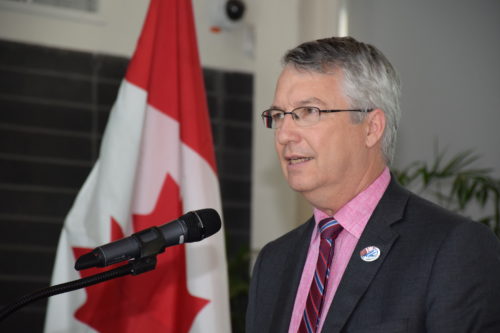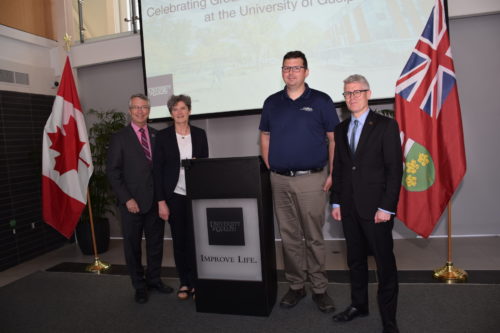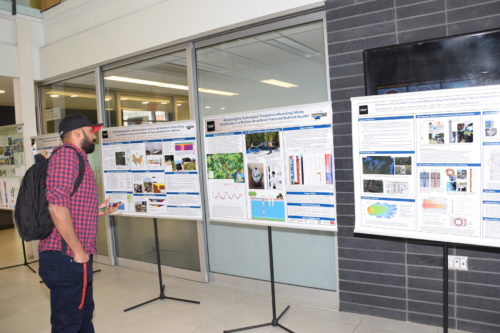
University of Guelph researchers will help to ensure safe, sustainable drinking water for Wellington County’s growing population through groundwater studies to be funded by almost $11 million from the federal government and local government and industry partners.
The new funding will enable U of G investigators monitoring local bedrock aquifer wells to learn more about groundwater and its interaction with surface water – information that will ultimately help the City of Guelph and nearby municipalities manage resources more sustainably, said engineering professor Beth Parker.
The project will be supported by research chair and project funding from the Natural Sciences and Engineering Research Council of Canada (NSERC) that was announced on campus today.
The federal granting agency will provide $3.125 million for renewal of an NSERC Industrial Research Chair held by Parker since 2007. Her chair renewal will be supported by matching industry funding.
A separate NSERC grant worth just over $2 million was also announced today for the groundwater monitoring project. That funding will also be matched by industry and municipal support, including $400,000 from the City of Guelph and $460,000 from Nestlé Waters Canada.

“I am thrilled to see that funding is being applied for groundwater research, given that Guelph’s water supply originates from groundwater,” said Guelph MP Lloyd Longfield. “It will be helpful to further this research, including cold geothermal heating and cooling of buildings in our downtown, and apply these studies to other communities in Canada, including our First Nations.”
Malcolm Campbell, U of G vice-president (research), said, “This generous funding in support of a research superstar and her team will fuel important discoveries and catalyze impactful innovations aimed at underpinning the safety of our local drinking water supply. Through this vital support from NSERC and industrial and municipal partners, Dr. Parker and her research team will generate knowledge and tools that will help protect and sustain our groundwater resources, improving lives in Guelph and surrounding communities.”
Fractured bedrock aquifers provide drinking water for more than one million people living in some of southern Ontario’s fastest-growing communities, including Guelph, which is projected to grow to almost 170,000 people by 2031.
Over the past decade, a U of G team led by Parker has installed high-resolution monitoring systems in bedrock aquifer wells around Guelph and southern Wellington County.
She directs the U of G-based G360 Institute for Groundwater Research, which studies complex local aquifers, including how natural features protect this water resource and how wells affect groundwater.

“The sustainability of groundwater as source water for communities ultimately depends on the quality and quantity of local groundwater,” she said, adding that “municipalities need more and better-resolution information to understand the status and vulnerability of our water resources so that good science can underpin water protection and management.”
Under provincial law, Ontario communities are required to develop source water protection plans to protect and sustain municipal sources of drinking water from potential threats.
Wayne Galliher, division manager of the City’s water services, said, “It’s up to us to ensure our community continues to have safe, high-quality drinking water, and part of that is understanding our water sources. Through the University’s research, we will have a much more comprehensive understanding of our water supply and enhanced monitoring abilities.”
Dave Belanger, the City’s water supply program manager, said working with G360 provides “a more comprehensive understanding of our water supply and a better monitoring program. That’s a benefit of the high-level, state-of-the-art research that comes out of the University to help us manage our groundwater resources.”
The institute has worked with site owners and the City of Guelph on groundwater system characterization and monitoring of contaminated sites since 2003. Besides helping to improve local decision-making for sustainable water management, the project has involved many students training for careers in consulting, industry, and government agencies.
Nestlé Waters Canada has provided funding to G360 for several years, including $460,000 in 2016 to examine groundwater sustainability in southern Wellington County. The company also provided $200,000 in 2018 for drilling work in Puslinch Township.
“Both the City and Nestlé maintain their own well networks for permitting requirements, but the University project provides more detailed and integrated information,” said Andreanne Simard, natural resource manager with the company in Puslinch.
“The more data we have, the better able we will be to understand the resource and address any future issues. This project shows industry and the University and municipalities working together on the same goal to protect and understand groundwater resources.”
 Groundwater is replenished by water that may be intercepted or contaminated by underground infrastructure and by land uses, including road salt and runoff from farms, industry and homes. Under the project, U of G researchers will study effects on groundwater of changing rainfall frequency and intensity as well as soil freeze-thaw cycles, all connected to climate change.
Groundwater is replenished by water that may be intercepted or contaminated by underground infrastructure and by land uses, including road salt and runoff from farms, industry and homes. Under the project, U of G researchers will study effects on groundwater of changing rainfall frequency and intensity as well as soil freeze-thaw cycles, all connected to climate change.
“People are concerned about different weather patterns,” said engineering professor Jana Levison. “Changes in temperature and rainfall intensity can impact how much water gets to groundwater or streams. We need to understand more about water resources in a changing climate.”
Engineering professor Bahram Gharabaghi plans to study “smart” winter road salting practices. He hopes to help improve information systems to ensure that road salt is applied where and when it’s needed to ensure traffic safety and protect the environment.
“Unless we proactively take measures to protect our precious and vital groundwater resource, it will not be available for future generations to enjoy,” Gharabaghi said.
Environmental sciences professor Emmanuelle Arnaud will study groundwater geology. “While contaminants come from specific sources, understanding of the subsurface geology will inform how and when those contaminants might reach specific receptors and how best to mitigate those impacts,” she said.
Project funding will also come from the Town of Erin and local geophysical company Paterson Grant and Watson.